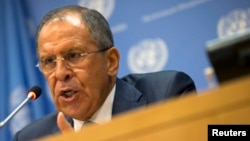Russia says U.S. and Arab allies bombing Islamic State militants in Syria are violating international law because they have not received permission from authorities in Damascus.
Russian Foreign Minister Sergei Lavrov says any use of force against terrorist threats should be done in accordance with international law and with the consent of the countries where that use of force is taking place.
Speaking to reporters at the United Nations, Lavrov said, "It's very important that such cooperation with Syrian authorities is established, even now that it is an accomplished fact, because excluding Syrian authorities from the struggle that is taking place, the effort that is taking place on their territory not only goes against international law but undermines the efficiency of the effort.
Unlike Iraq, which has requested airstrikes against Islamic State fighters, U.S. and allied attacks in Syria have been made without the permission of President Bashar al-Assad.
Ahead of the airstrikes, U.S. State Department spokeswoman Jen Psaki says Syria's United Nations ambassador was informed about Washington's intent to take action, and government forces were warned not to engage U.S. aircraft.
Psaki says the Obama administration did not request the Assad government's permission, did not coordinate its actions, and provided no advance notification of timing or targets.
Foreign Minister Lavrov's criticism was the strongest so far at a U.N. General Assembly during which nearly every speaker has warned of Islamic State threats. President Obama appears to have blunted misgivings about U.S. military action in the Middle East by including forces from Bahrain, Saudi Arabia, the United Arab Emirates, Jordan and Qatar.
U.N. Secretary General Ban Ki-moon says those involved in this military campaign must abide by international humanitarian law, but he appeared to set aside that it was conducted without Syria's approval.
"I note that the government was informed beforehand," he said. "I also note that the strikes took place in areas no longer under the effective control of that government. I think it is undeniable - and the subject of broad international consensus - that these extremist groups pose an immediate threat to international peace and security."
U.S. officials also say the strikes are justified in that some of them target the Khorasan group, an arm of al-Qaida, which Washington says poses a threat to the United States and its allies.










